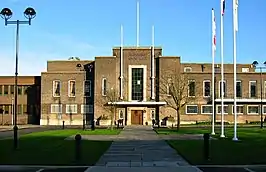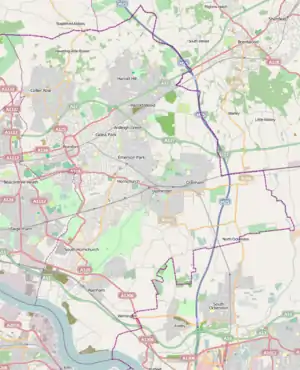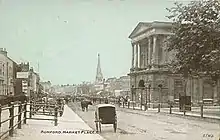Havering Town Hall
Havering Town Hall is a municipal building in Main Road, Romford, London. The town hall, which is the headquarters of Havering London Borough Council, is a Grade II listed building.[1]
| Havering Town Hall | |
|---|---|
 Havering Town Hall | |
| Location | Main Road, Romford |
| Coordinates | 51.5814°N 0.1836°E |
| Built | 1937 |
| Architect | Herbert R Collins and Antoine Englebert O Geens |
| Architectural style(s) | International Moderne style |
Listed Building – Grade II | |
| Designated | 17 February 1999 |
| Reference no. | 1245551 |
 Shown in Havering | |
History

In the second half of the 19th century the local board of health was based in offices in the Market Place in Romford before acquiring the old court house of the independent liberty of Havering in the Market Place in 1892.[2] The local board was restructured as an urban district in 1894 and, after the old court house became inadequate for their needs, civic leaders decided to procure a purpose-built town hall: the site selected in Main Road had previously been open land.[3] The council relocated to temporary offices in South Street in 1931 while it waited for the new building to become available.[4]
The new building was designed by Herbert R Collins and Antoine Englebert O Geens in the International Moderne style and was officially opened as Romford Town Hall by the Lord Mayor of London, Sir George Broadbridge, on 16 September 1937.[5] The district was also incorporated as a municipal borough that year and Broadbridge took the opportunity to present the charter of incorporation to the charter mayor, Councillor Charles Allen, on the same day.[5] The design for the building, which had a Scandinavian element to it,[6] involved an asymmetrical main frontage facing onto Main Road; it featured a tower on the left with a doorway and canopy on the ground floor and a tall window on the first floor flanked by flagpoles with a further flagpole on the roof; to the right were eleven bays with windows on each of the ground and first floors.[1] The building was extended by three bays to the left in a similar style in 1960.[1] Internally, the main rooms were council chamber and two large committee rooms.[1]
The building remained the local seat of government, and was renamed "Havering Town Hall", when the expanded London Borough of Havering was formed in 1965.[7] Queen Elizabeth II, accompanied by the Duke of Edinburgh attended a civic lunch with council officials on 6 March 2003.[8] In January 2016, following a debate in the council chamber, Havering Council became the first council in the UK to join the campaign to leave the European Union.[9][10][11]
The town hall was extensively restored and redecorated in autumn 2017.[12]
References
- Historic England. "Havering Town Hall (1245551)". National Heritage List for England. Retrieved 5 May 2020.
- Powell, W R (1978). "'The liberty of Havering-atte-Bower', in A History of the County of Essex". London: British History Online. pp. 1–8. Retrieved 7 September 2020.
- "Ordnance Survey Map". 1920. Retrieved 5 May 2020.
- Powell, W R (1978). "'Romford: Local government', in A History of the County of Essex". London: British History Online. pp. 76–82. Retrieved 5 May 2020.
- "The Lord Mayor of London, Sir George Broadbridge inspecting a guard of honour at Romford". Alamy. Retrieved 5 May 2020.
- Cherry, Bridget; Bradley, Simon; O'Brien, Charles; Pevsner, Nikolaus (2005). London: East. Yale University Press. p. 85. ISBN 978-0300107012.
- "Local Government Act 1963". Legislation.gov.uk. Retrieved 25 April 2020.
- "When the Queen Came to Town" (PDF). Living in Havering. 2012. p. 10. Retrieved 5 May 2020.
- "Havering Town Hall, Main Road, Romford, London, UK". Alamy. 27 January 2016. Retrieved 5 May 2020.
- Brown, Colin (2013). Glory and Bollocks: The Truth Behind Ten Defining Events in British History. Oneworld Publications. ISBN 978-1851689927.
- "Havering 'the most Eurosceptic area of Britain'". BBC. 29 February 2016. Retrieved 5 May 2020.
- "HBS appointed at Grade II listed Havering Town Hall". HBS. Retrieved 5 May 2020.
